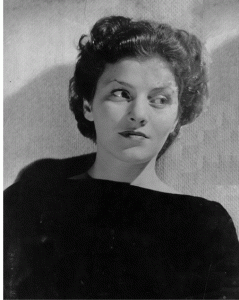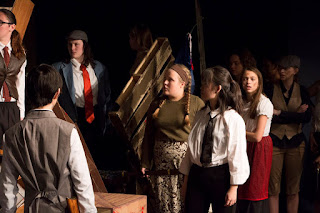I have to say that I am not afraid of acting, because I started acting before junior year. The funny story also related to Ms. Guarino. In my freshman year, because I wanted to improve my English speaking, I signed fall drama. The fall drama was Peter Pan, and I played an Indian queen. I thought the role at least is a queen, so the queen must be somehow strong and important. However, the queen basically did nothing in the play. All she did were kneeling to Peter Pan, being robbed by the pirates, and being killed in the end. She was so weak that she lost every battle. In my hometown, we don't kneel easily because the old tradition regards kneeling as our reputations and sometimes self-esteem. The tradition tells us not to kneel easily if they are not gods, or parents. I did not care about the tradition that much, but back at that time, I still felt uncomfortable with kneeling. However, after a while, when I saw how much efforts and passions the others dedicated, I was moved and then I found out the interest of acting. Acting asked actors to not show themselves but be the others that they depict. Therefore, once you are on the stage, you cannot have so much self-consciousness. After the show, I began to enjoy playing different roles. This lesson made me be more outgoing and helped me think out of the box. Moreover, it caused me to want to challenge playing the roles that are totally different from me. The class provided chances for me to act. We performed a monologue, straight play, speaking poems, and we played theater games.
For the theater games, I remembered the educator I researched was well-known for theater improvisation game. Viola Spolin, a beautiful lady, the educator who created theater games for acting training. I first picked her as my presentation is not because of her well-known theater game or her beauty but her name. Viola, the name of a string, got my interest immediately.  Viola Spolin
Viola Spolin
I remembered our presentations of acting pioneers should be 10-20 minutes long. However, I used a whole class presenting her ideas and led the class play theater game for a long time. I like the mirror game. The game is about two people face each other, one of them starts telling a story while doing movement and the other should imitate the person's movement and retell the person's words. I also liked the game that says only one sentence, "How are you?", in different situations.
For the performance, I enjoyed the game that acting out Romeo and Juliet in 3 minutes, 1 minute, and 15 seconds. We were divided into groups, Yun, Aaron, and I were in the 15-second group. When we were heard that we were going to act out the entire story in 15 seconds, I was so shocked that I cannot react. I was like "What?" "How can it be possible?", and then I was so excited, "Yes! It is so fun!!" In the end, we acted out in exactly 15 seconds. I played Juliet, Aaron was Romeo, and Yun was the person who split us apart. We did not speak any word. In the 15 seconds, we acted out how Romeo and Juliet fall in love in first sight, and how they are separated and died one after another. That is the first silent show I acted, and it was exciting that I can never forget.
I love acting, and I love watching movies and understanding a character. It is my interest. Therefore, there is no success or failure for me to discuss since I did not take the class as a "class", or a "task". Instead, the class is more like a platform that allows me to perform and have fun, and the class is more like a library that enriches my analysis skill. I enjoyed the whole process and had precious time in the class from the beginning to the end.



